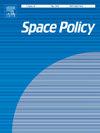Space and cybersecurity: Challenges and opportunities emerging from national strategy narratives
IF 1.9
4区 社会学
Q2 INTERNATIONAL RELATIONS
引用次数: 0
Abstract
Modern societies are increasingly dependent on space technology. The number of activities that rely on space infrastructure includes global positioning and communications systems, financial transactions and global trade, public and private scientific research, environmental monitoring and fore-casting, and audio-visual entertainment. Within the security and defence domain, this reliance becomes even more pronounced as satellites enhance command, control, communications and intelligence, surveillance, and recon-naissance (C4ISR), missile defence, or advanced autonomous systems. Furthermore, ongoing advancements in science and technology are opening new frontiers in outer space, promising significant economic potential through ventures like space travel and space mining. Considering the geopolitical implications of the dependence on space technology, the objective of this study is to examine how Western countries and organizations understand space within their strategic thinking. By conducting a comparative analysis of the most recent national security strategies and security and defence space strategies released by a sample of Western countries and organizations, including the United States, the United Kingdom, France, the European Union and NATO, this study aims to discern the narratives employed to depict the space domain and to identify the key trends within it, with a specific focus on the interplay between space and cybersecurity.
This exercise will facilitate the identification of areas where enhanced collaboration among the selected actors is feasible or where competition may define their relationships. Consequently, it will help determine the potential for a coordinated response to collective challenges.
空间与网络安全:来自国家战略叙述的挑战与机遇
现代社会越来越依赖于空间技术。依赖空间基础设施的活动包括全球定位和通信系统、金融交易和全球贸易、公共和私营科学研究、环境监测和预报以及视听娱乐。在安全和国防领域,随着卫星增强指挥、控制、通信和情报、监视和侦察(C4ISR)、导弹防御或先进的自主系统,这种依赖变得更加明显。此外,科学和技术的不断进步正在外层空间开辟新的疆域,通过太空旅行和太空采矿等企业带来了巨大的经济潜力。考虑到对空间技术依赖的地缘政治影响,本研究的目的是研究西方国家和组织如何在其战略思维中理解空间。通过对包括美国、英国、法国、欧盟和北约在内的西方国家和组织发布的最新国家安全战略和安全和防务空间战略进行比较分析,本研究旨在辨别用于描述空间领域的叙述,并确定其中的关键趋势,特别关注空间与网络安全之间的相互作用。这项工作将有助于确定在哪些领域可以在选定的行动者之间加强合作,或在哪些领域竞争可能界定它们的关系。因此,它将有助于确定对集体挑战作出协调反应的潜力。
本文章由计算机程序翻译,如有差异,请以英文原文为准。
求助全文
约1分钟内获得全文
求助全文
来源期刊

Space Policy
Multiple-
CiteScore
3.40
自引率
36.40%
发文量
40
期刊介绍:
Space Policy is an international, interdisciplinary journal which draws on the fields of international relations, economics, history, aerospace studies, security studies, development studies, political science and ethics to provide discussion and analysis of space activities in their political, economic, industrial, legal, cultural and social contexts. Alongside full-length papers, which are subject to a double-blind peer review system, the journal publishes opinion pieces, case studies and short reports and, in so doing, it aims to provide a forum for the exchange of ideas and opinions and a means by which authors can alert policy makers and international organizations to their views. Space Policy is also a journal of record, reproducing, in whole or part, official documents such as treaties, space agency plans or government reports relevant to the space community. Views expressed in the journal are not necessarily those of the editors or members of the editorial board.
 求助内容:
求助内容: 应助结果提醒方式:
应助结果提醒方式:


